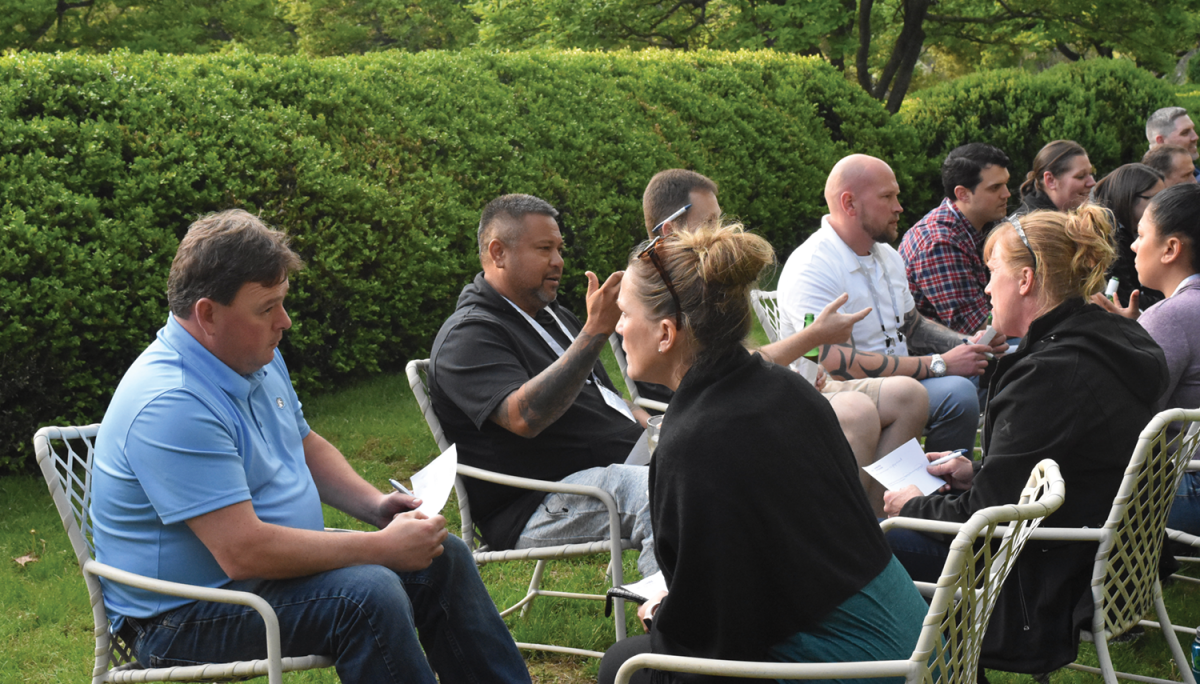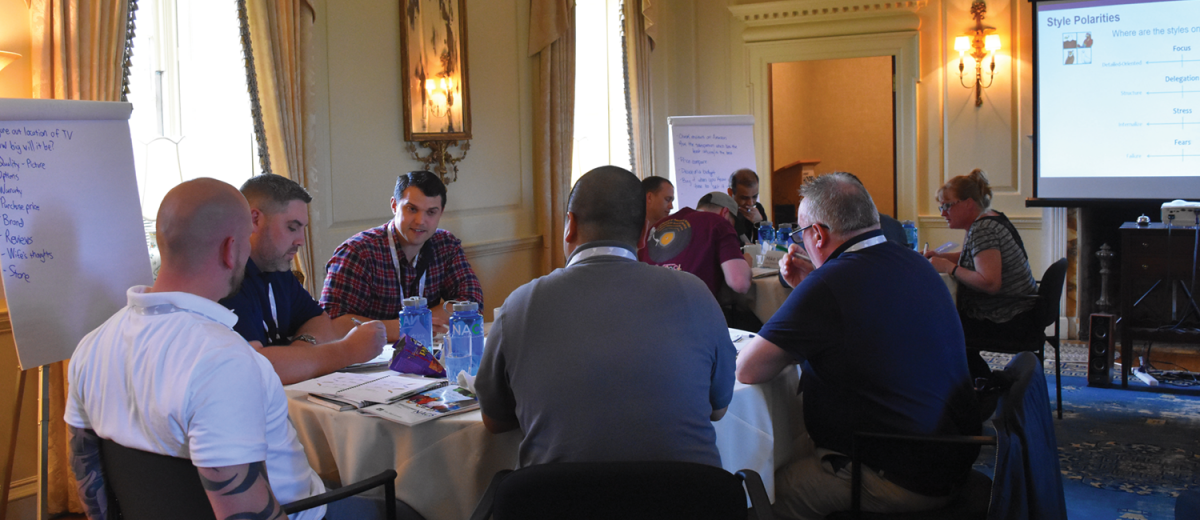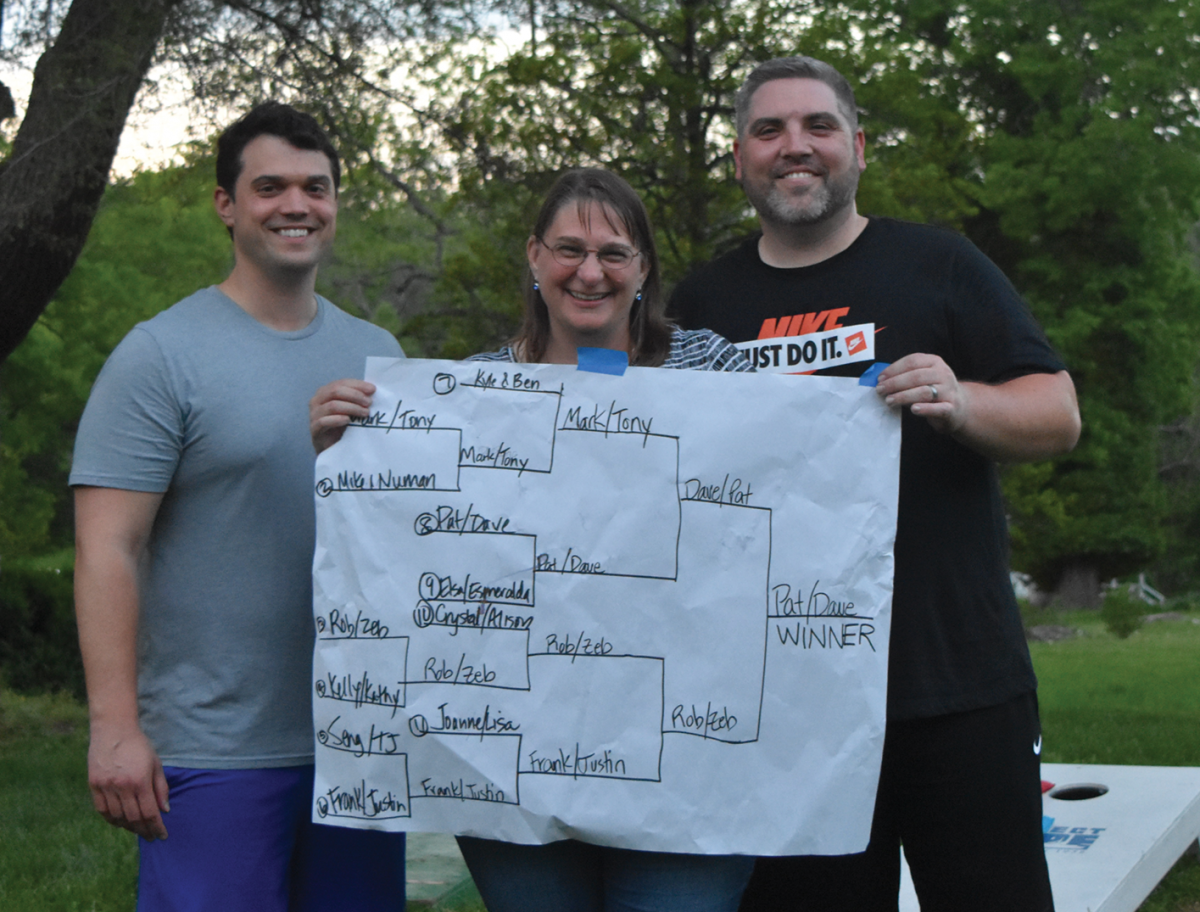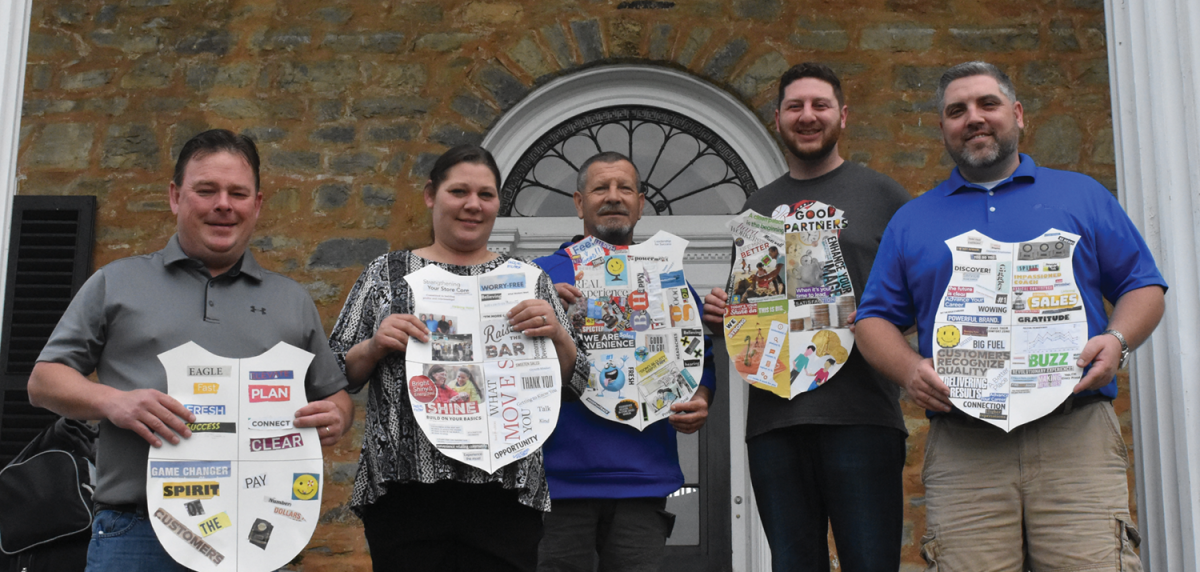 Each spring, leaders from across the industry attend the NACS Leadership for Success program to develop their skills as a leader, learn from industry peers and discover personal strengths. The six-day program aims to arm participants with practical skills they can use immediately on the job to improve their leadership and operational performance.
Each spring, leaders from across the industry attend the NACS Leadership for Success program to develop their skills as a leader, learn from industry peers and discover personal strengths. The six-day program aims to arm participants with practical skills they can use immediately on the job to improve their leadership and operational performance.
“It’s a full immersion development program,” said Joanne Loce, who is the lead facilitator for Leadership for Success. “It’s a customized learning experience that focuses on leadership skills in the convenience store industry.” Loce is managing partner of Fortify Leadership Group and president of Loce Consulting LLC.
At the end of the program, which is generously endowed by The Hershey Company, attendees leave with a work project they have identified and must complete during the next six months. They also leave as a member of a small group of fellow attendees, and they are expected to communicate with the team their project’s progress, as well as any obstacles or triumphs they encounter during the period.
At the end of the six months, the attendees present the results of their projects to their industry peers at the NACS Show during a special education session. To close out the program, NACS celebrates attendees with a graduation ceremony and dinner.
Looking Within, Sharpening Skills
The first day and a half of the program focuses on building self-awareness. Before attendees arrive on site, they are required to take a DISC assessment, which identifies their personal strengths and leadership skills. “It’s all about the individual assessing themselves and building that self-awareness,” said Loce.
For Kathy Commeau, territory manager for RH Foster Energy LLC, the assessment was a key aspect of the program. “To be able to home in on what makes me the leader that I am—it was instrumental,” said Commeau.


 One of the biggest takeaways for program attendees is the ability to learn from other industry professionals who are facing similar challenges.
One of the biggest takeaways for program attendees is the ability to learn from other industry professionals who are facing similar challenges.
Attendees also take an emotional intelligent assessment and look at the 360-degree feedback given ahead of time by their own colleagues before the attendees head to the program.
After the self-awareness portion of the program, attendees move into the skill-assessment portion. They are instructed to set high-level goals, which can be anywhere from business performance goals to providing feedback and coaching employees. “They are asked to reflect on ‘How do you recognize and how do you lead change?’” said Loce.
The program’s objective is to arm attendees with core leadership skills that are practical and can be easily applicable to their own work and companies. “It’s important that we ground [these skills] so they can apply them to their individual roles,” said Loce.
Commeau said that spending a week interacting with other people who face the same challenges she does was a huge takeaway. “Regardless of the size of the company, we all need to work through similar roadblocks, and it’s nice to know we are not alone,” she said. Commeau utilizes what she’s learned about her own leadership style to better connect with her colleagues and direct reports. “I ask myself, ‘How do I better leverage this leadership style to complete this task?’”
Different Ways to Learn
Through a combination of classroom teaching, exercises and personal application, the program implements a variety of learning tools to develop attendees’ leadership skills. For example, reflection walks are a large component of Leadership for Success. Attendees are asked to take a walk with a fellow classmate through the grounds of the venue. The walks allow each person to think about their personal challenges in their businesses and how they can implement the day’s activities in their jobs. Attendees are encouraged to find different classmates for each walk so they can obtain a variety of insights and perspectives on their particular challenges back at their workplace.
Each day concludes with an action-planning activity. At the beginning of the program, attendees listed their own challenges at their jobs, reflecting on what they learned that day and writing down goals and actions to combat their challenges.
“They’re developing an action plan that’s not a ‘wouldn’t this be nice’ [plan], but an action plan they can actually implement with tangible steps,” said Loce.
To be able to home in on what makes me the leader that I am—it was instrumental.
The Final Countdown
The final component is the report out during the NACS Show. “It’s a unique opportunity to present the results of their project to the industry. They get to radically say, ‘I face challenges like you, here’s the work I did and the results that I got,’” said Loce.
To prepare them for their presentation at the Show, Loce divides the attendees into groups of three to five at the end of the program. She sorts them based on their natural work styles and the synergy they show throughout the program. Once assigned, she asks the team to find a common theme for everyone’s business goals and decide how they will measure each member’s successes.
After the program, the team is required to have at least three meetings, and they are assigned a coach who checks in on them to make sure they apply the skills they learned during the program. Loce encourages attendees to leverage their teammates for moral support and work together to craft their individual stories. She asks them to tie their projects, goals and challenges to the common theme.
The 2019 Leadership Forum Report Out featured four different teams. One team, “Service Stars,” strived to create a higher level of service for their customers throughout their projects. “We’re in business for our customers, and if we can get this right, we can guarantee success,” said Tony Marino, territory manager at R.H. Foster and member of Team Service Stars.
 After the program ends, attendees are placed into teams to help each other on their work projects, which they report about at the NACS Show.
After the program ends, attendees are placed into teams to help each other on their work projects, which they report about at the NACS Show.
The Service Stars’ projects included revamping a training program, increasing in-stock merchandise for customers, boosting beer sales and better promoting a customer loyalty card. Each team member experienced successes, which they attributed to skills they learned during the program, such as the leadership style assessment they took at the start.
“Through DISC training, I was successfully able to communicate with others for a successful outcome,” said TJ Tellez, store manager for the Robinson Oil Corporation. Because of the assessment, Tellez was able to better understand his own leadership style and how he communicates, as well as the communication styles of others.
The “Missing Links” team theme emerged through each member’s project—finding the “missing link” to a successful store. Elisa Williams’ project focused on the missing link in her stores—team member engagement. Williams, an area manager with Double Quick, aimed to reduce turnover and develop her employees’ people skills by establishing pre-shift huddles, one-on-one counseling and coaching and training.
“A properly trained team member can become a good team motivator and grow with the company,” said Williams, who developed a training method for her store managers to implement. Williams saw a lot of improvements among her store managers and their teams.
“They’re more engaged,” she said.
Similarly, Commeau’s project measured the confidence level of trainers and trainees after participating in a new training program. Afterward, she asked both the trainer and the employee who participated to answer a short survey tailored to their roles. “The results were favorable, and we continue to move forward with this training program within our organization,” said Commeau.
Overall, each participant in the Leadership for Success program saw improvement in their jobs, either as a direct result of the project or by utilizing the skills they learned during the program.
“The ability to work with a team on a six-month project and present at the NACS Show is a wonderful experience and provides an opportunity to build skills, such as project planning, time management, communication and teamwork,” said Commeau.
“This class was instrumental … for me. To take those lessons learned and apply them in store was key,” said Pat Schappell, district manager at Love’s Travel Stops and Country Stores. “I never would have gotten the results [I did] without NACS.”
Unlock Your Potential
NACS Leadership for Success is designed for district managers, supervisors and other convenience store retailers to raise their game and improve their leadership and operational performance.
Participants, who have been chosen by their companies, work on skills they can immediately use on the job, including:
• �Increasing their understanding of how their actions affect their personal effectiveness
• �Discovering how they work with others as well as how they are perceived by colleagues
• Defining a vision of their ideal leader-self
• �Mastering tools to improve their leadership effectiveness and building better relationships
• �Charting a course of action to apply what they have learned and become the leader they want to be
 The NACS Leadership for Success program is graciously endowed by The Hershey Co.
The NACS Leadership for Success program is graciously endowed by The Hershey Co.
For information on the program, or to register visit www.convenience.org/leadershipforsuccess.